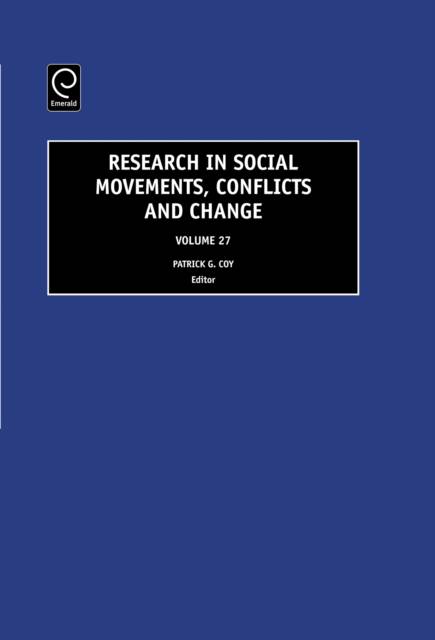
- Afhalen na 1 uur in een winkel met voorraad
- Gratis thuislevering in België vanaf € 30
- Ruim aanbod met 7 miljoen producten
- Afhalen na 1 uur in een winkel met voorraad
- Gratis thuislevering in België vanaf € 30
- Ruim aanbod met 7 miljoen producten
Zoeken
Research in Social Movements, Conflicts and Change, Volume 27
€ 249,95
+ 499 punten
Omschrijving
This volume of "Research in Social Movements, Conflicts and Change" contains a strong collection of theoretically rich and data-driven papers, which address a series of interrelated questions that are at the forefront of todays social movement scholarship. For example, political opportunity theory has been justly criticized for privileging structure over agency, politics over culture, and for failing to adequately specify how political opportunities differ for social movements in democracies vs. in non-democracies. In this volume, political opportunity theory receives careful, empirically-informed correctives from a number of quarters. In addition, a synthesis is achieved between nonviolent action scholarship and the contentious politics school of research. Equally important, the roles of collective identities, ideologies, identity talk, art, biographies, social networks, police repression, and participation pathways are analyzed within the context of social movements in the United States, Mexico, the Netherlands, India, Brazil, Northern Ireland, and in various non-democracies. This is that too rare collection which when taken together builds bridges between scholarship on social movements and on social conflicts, and in the process makes theoretical advances in each area in much needed yet creative ways. In that way, this volume carries on the distinguished tradition of the Research in Social Movements, Conflicts and Change series.
Specificaties
Betrokkenen
- Uitgeverij:
Inhoud
- Aantal bladzijden:
- 332
- Taal:
- Engels
- Reeks:
- Reeksnummer:
- nr. 27
Eigenschappen
- Productcode (EAN):
- 9780762313181
- Verschijningsdatum:
- 8/05/2007
- Uitvoering:
- Hardcover
- Formaat:
- Genaaid
- Afmetingen:
- 163 mm x 231 mm
- Gewicht:
- 476 g

Alleen bij Standaard Boekhandel
+ 499 punten op je klantenkaart van Standaard Boekhandel
Beoordelingen
We publiceren alleen reviews die voldoen aan de voorwaarden voor reviews. Bekijk onze voorwaarden voor reviews.










